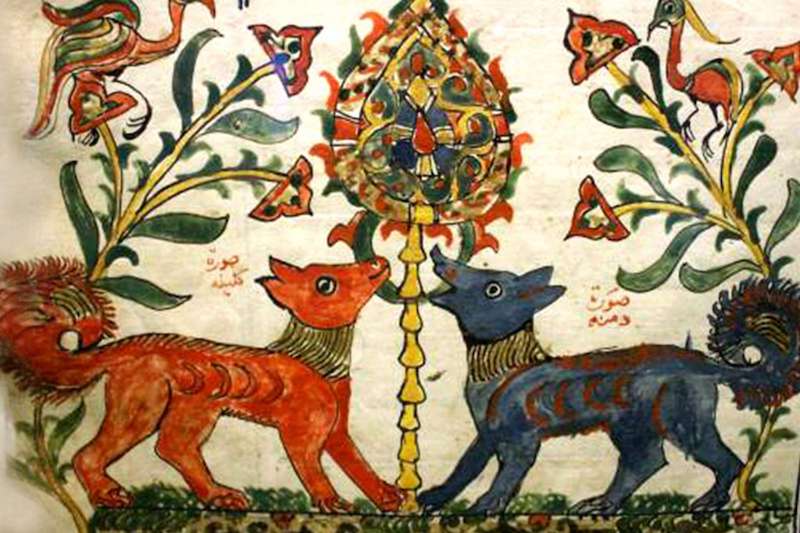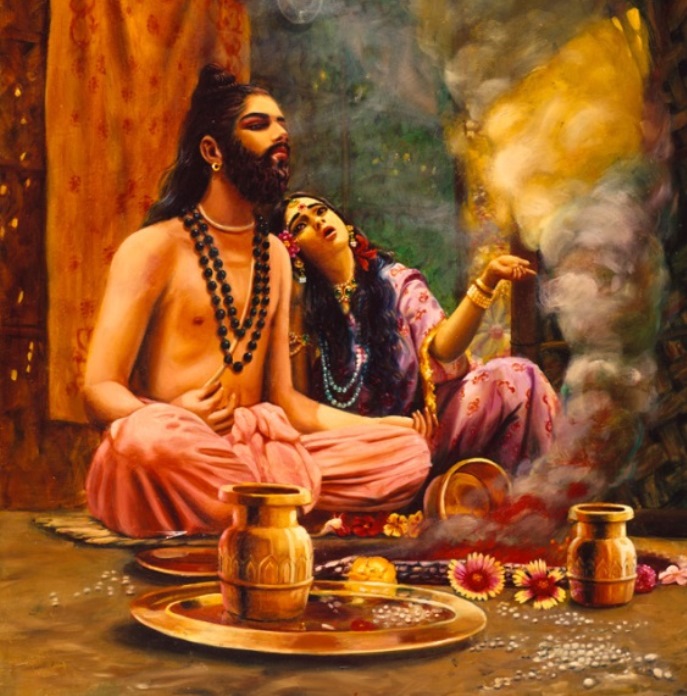Due to his arrogance, he who disrespects persons who occupy the highest, the lowest and mid-level positions in the employment of the king, loses his respect and high position much like Dantila.
Sanjeevaka, on hearing this story, said…

“O Good man! You are correct. I will always act as per your advice.”
Damanaka then took Sanjeevaka to meet Pingalaka. “My Lord!”, said Damanaka, as he saluted him, ” I present to you – Sanjeevaka.”
The bull saluted Pingalaka, and stood in front of him, humbly waiting for what the king had to say.
Pingalaka placed his right hand, decorated by his sharp nails, on Sanjeevaka’s fat and elongated hump…and addressed him with respect. “How are you Sanjeevaka? What made you come to this deserted forest?”
Sanjeevaka told him all about his journey, from Vardhamaana to being abandoned on the banks of the river Yamuna. Hearing this, Pingalaka said “My dear friend! Do not fear now. You are now under my protection, and can stay in this forest for as long as you like. But remember to always stay by my side, since this forest is full of wild animals, one more dangerous than the other. Besides, you just eat grass; those animals are hunters, and can be dangerous…”
Having said this, Pingalaka started towards the river, where he and his entourage drank water to their heart’s content, and later retired deep into the forest. In the coming days and months, he left the responsibility of the kingdom on the “able” shoulders of Karataka and Damanaka, and himself spent all his time with Sanjeevaka discussing philosophy and the sayings of the wise.
It has been rightly said…
यदृच्छयाप्य् उपनतं सकृत् सज्जन-सङ्गतम् ।
भवत्य् अजरम् अत्यन्तं नाभ्यास-क्रमम् ईक्षते ॥ १६२ ॥
yadṛcchayāpy upanataṃ sakṛt sajjana-saṅgatam |
bhavaty ajaram atyantaṃ nābhyāsa-kramam īkṣate || 162 ||
Friendship with good people, even if developed by coincidence, stays for life. It does not depend solely on meeting constantly, or staying in touch every day.
Sanjeevaka was well-versed in many sciences and was very wise. Within a few days, he changed the once-foolish Pingalaka into an intelligent person. Pingalaka no more craved violence – he transitioned from animal-like behaviour, and cultivated a more civilised approach. He was very influenced by Sanjeevaka, and they started having private conversations, away from the other animals, even Karataka and Damanaka were not party to their conversations.
In time, since Pingalaka had stopped hunting, the other animals, Karataka and Damanaka included, started to starve, and fall sick as a result. They all huddled together, with hardly any energy left to do anything else. It is said…
फल-हीनं नृपं भृत्याः कुलीनम् अपि चोन्नतम् ।
सन्त्य् अज्यान्य् अत्र गच्छन्ति शुष्कं वृक्षम् इवाण्डजाः ॥ १६३ ॥
phala-hīnaṃ nṛpaṃ bhṛtyāḥ kulīnam api connatam |
santy ajyāny atra gacchanti śuṣkaṃ vṛkṣam ivāṇḍajāḥ || 163 ||
Even if the king belongs to a good family and considered great, if there is nothing to be gained from him, his servants leave him and go elsewhere, much like the birds leave a dry, fruitless tree, however big it may be.
And also…
अपि संमान-संयुक्ताः कुलीना भक्ति-तत्-पराः ।
वृत्ति-भङ्गान् महीपालं त्यजन्त्य् एव हि सेवकाः ॥ १६४ ॥
api saṃmāna-saṃyuktāḥ kulīnā bhakti-tat-parāḥ |
vṛtti-bhaṅgān mahīpālaṃ tyajanty eva hi sevakāḥ || 164 ||
Even if well-respected, even if born in a good family, even if very much in devotion, servants leave a king if he does not compensate them.
कालातिक्रमणं वृत्तेर्यो न कुर्वीत भूपतिः ।
कदाचित् तं न मुञ्चन्ति भर्त्सिता अपि सेवकाः ॥ १६५ ॥
kālātikramaṇaṃ vṛtteryo na kurvīta bhūpatiḥ |
kadācit taṃ na muñcanti bhartsitā api sevakāḥ || 165 ||
Servants never leave a king who pays them in time, even if they are treated rudely by him.
It is not just servants who think and behave this way. Everyone does this to survive; they use Sama (cajoling or convincing), Daama (putting a price on everything), Danda (punishment) and Bheda (causing a divide, in order to win or rule)…they try to get their way through any means possible.
Because…
देशानाम् उपरि क्ष्माभृद् आतुराणां चिकित्सकाः ।
वणिजो ग्राहकाणां च मूर्खाणाम् अपि पण्डिताः ॥ १६६ ॥
deśānām upari kṣmābhṛd āturāṇāṃ cikitsakāḥ |
vaṇijo grāhakāṇāṃ ca mūrkhāṇām api paṇḍitāḥ || 166 ||
प्रमादिनां तथा चौरा भिक्षुका गृह-मेधिनाम् ।
गणिकाः कामिनां चैव सर्व-लोकस्य शिल्पिनः ॥ १६७ ॥
pramādināṃ tathā caurā bhikṣukā gṛha-medhinām |
gaṇikāḥ kāmināṃ caiva sarva-lokasya śilpinaḥ || 167 ||
सामादि-सज्जितैः पाशैः प्रतीक्षन्ते दिवा-निशम् ।
उपजीवन्ति शक्त्या हि जलजा जलदान् इव ॥ १६८ ॥
sāmādi-sajjitaiḥ pāśaiḥ pratīkṣante divā-niśam |
upajīvanti śaktyā hi jalajā jaladān iva || 168 ||
A king for his subjects, the doctor for his patients, the seller for his customers, the clever for the fools, the thieves for people who aren’t cautious, prostitutes for their clients, workers for everyone else..they all wait day and night, with their well-laid traps, waiting to catch them unawares, and use them for their own survival. Much like bigger fish eat smaller fish, in order to survive.
It is also well said that…
सर्पाणां च खलानां च पर-द्रव्यापहारिणाम् ।
अभिप्राया न सिध्यन्ति तेनेदं वर्तते जगत् ॥ १६९ ॥
sarpāṇāṃ ca khalānāṃ ca para-dravyāpahāriṇām |
abhiprāyā na sidhyanti tenedaṃ vartate jagat || 169 ||
The wishes of snakes, thieves and bad people do not get fulfilled; this is the reason why the world still lives on.
अत्तुं वाञ्छति शाम्भवो गणपतेर् आखुं क्षुधार्तः फणी तं च क्रौञ्च-रिपोः शिखी गिरि-सुता-सिंहो ऽपि नागाशनम् ।
इत्थं यत्र परिग्रहस्य घटना शम्भोर् अपि स्याद् गृहे तत्राप्य् अस्य कथं न भावि जगतो यस्मात् स्वरूपं हि तत् ॥ १७० ॥
attuṃ vāñchati śāmbhavo gaṇapater ākhuṃ kṣudhārtaḥ phaṇī taṃ ca krauñca-ripoḥ śikhī giri-sutā-siṃho ‘pi nāgāśanam |
itthaṃ yatra parigrahasya ghaṭanā śambhor api syād gṛhe tatrāpy asya kathaṃ na bhāvi jagato yasmāt svarūpaṃ hi tat || 170 ||
The hungry snake hanging on the neck of Lord Shiva wishes to swallow the rat, which is the vehicle of his son Ganesha; the peacock, which is the vehicle of Kumaara, wishes to eat that snake; the peacock which wishes to eat the snake is desired by the lion, who is the vehicle of Girijaa, the wife of Lord Shiva. When such a situation exists in the house of Lord Shiva himself, then why wouldn’t it exist everywhere else?

I leave you with this thought – a very powerful one indeed. One of the most striking messages of the Panchatantra – that man, by his very nature, is selfish, and will go to any means to satisfy his needs and wants. The Panchatantra is full of stories that detail this truth in many ways, and through many characters, but it does not give a resolution.
The Panchatantra can be thought to address three pillars of Dharmic thought – Dharma (right action), Artha (prosperity) and Kama (desire).
The fourth, moksha (liberation) is a consequence of the right fulfilment of the other three. This is a topic in itself, and hence I would not like to elaborate at present. But yes, as stated before, the Panchatantra does not give us a resolution on a plate. It serves as a catalyst, for us to think, deliberate and arrive at a right conclusion. Let us meditate on this thought…
to be continued…
